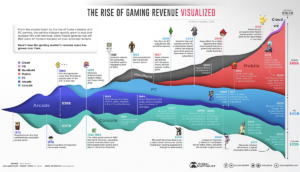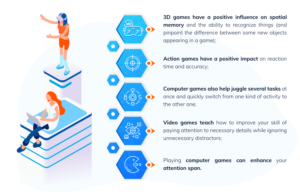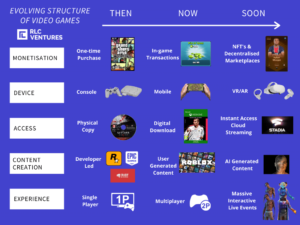Gaming Genres

The gaming industry has undergone a remarkable transformation in recent years, diversifying its offerings to cater to the varied preferences and needs of an ever-expanding player base (Chakraborty et al., 2015). One of the key factors driving this evolution is the ongoing innovation in graphical technologies, which has enabled game developers to create increasingly immersive and visually stunning gaming experience
s. The transition from 2D to 3D graphics in the 1990s, for instance, profoundly impacted the types of gameplay and genres that emerged, leading to a proliferation of new and exciting gaming categories.
Emerging Gaming Genres and their Evolving Dynamics

Beyond the traditional genres, such as first-person shooters and real-time strategy games, the gaming landscape has witnessed the rise of a myriad of new categories that cater to diverse player interests. Gaming
innovations have occurred in genres, hardware and accessibility, social features, and playability, resulting in a more inclusive and diverse gaming ecosystem.
One notable example is the increasing involvement of female adolescents in gaming activities, particularly those that intersect with social media and related online activities. As the gaming industry continues to evolve, it has become crucial to understand the underlying social and psychological dynamics that shape the gaming experiences of different demographic groups.
Exploring the Psychological and Social Implications of Gaming

The rise of gaming as a mainstream leisure activity has also brought to the forefront the need to examine its psychological and social implications. While gaming can offer beneficial outcomes, such as improved focus, multitasking, and working memory, it can also have potential drawbacks, especially when it is used excessively. (Heiden et al., 2019)
One area of concern is the phenomenon of “dark participation” in games, which refers to the emergence of negative behaviors and attitudes within gaming communities, such as harassment, toxicity, and exclusio
n. Understanding these behaviors and their underlying causes is crucial for fostering a more inclusive and positive gaming culture.
Additionally, research has highlighted the differential impact of various game genres on psychological functioning. Specifically, distraction-motivated players and action game players have been associated with increased psychological health risks, underscoring the need for a nuanced approach to understanding the relationship between gaming and well-being.
Balancing the Narrative: Recognizing the Benefits of Gaming

While the potential negative effects of gaming have been extensively studied, it is essential to maintain a balanced perspective and consider the benefits that gaming can offer. Recent research has begun to document the positive outcomes of gaming, including cognitive, motivational, emotional, and social benefits.
For instance, gaming has been shown to enhance problem-solving skills by challenging players to think critically and develop innovative strategies to overcome in-game obstacles. Furthermore, gaming can serve as a source of social interaction and support, particularly for individuals who may struggle with traditional social settings. (Kuss et al., 2022) (Heiden et al., 2019) (Granic et al., 2014)
By considering the diverse landscape of gaming categories and the nuanced relationship between gaming and psychological well-being, website content can be crafted to provide a comprehensive and informative overview of the gaming industry.
Multiplayer Gaming
The rise of online multiplayer gaming has transformed the social dynamics of the gaming experience, fostering new forms of interaction and collaboration. (Amin et al., 2020) Multiplayer games often require players to work together, communicate effectively, and strategize collectively to achieve shared objectives, which can lead to the development of valuable social skills.
Mobile Gaming
The widespread adoption of smartphones and tablets has led to the rapid growth of the mobile gaming market, catering to the on-the-go needs of modern gamers. Mobile games often feature shorter gameplay sessions, intuitive controls, and accessible features that cater to a diverse audience, including casual and time-constrained players.
Casual Gaming

Alongside the rise of hardcore and competitive gaming, the gaming industry has also witnessed the emergence of casual gaming, which appeals to a broader demographic by offering simpler gameplay, lower barriers to entry, and a more relaxed gaming experience. Casual games often prioritize accessibility, social interaction, and shorter gameplay sessions, providing a gateway for newcomers to the gaming world.
By exploring the diverse landscape of gaming categories and their associated psychological and social implications, website content can provide a nuanced and comprehensive understanding of the evolving gaming industry.
Competitive Gaming

The surge in popularity of e-sports and competitive gaming has revolutionized the way players engage with and experience gaming. Competitive gaming tournaments and leagues have not only generated significant viewership and revenue but have also fostered a thriving community of dedicated players, spectators, and content creators. (Oe, 2020) (Granic et al., 2014)
Adventure Gaming

The adventure game genre has long been a staple of the gaming landscape, offering players immersive narratives, puzzle-solving challenges, and the opportunity to explore richly detailed virtual worlds. Recent advancements in technology have enabled developers to create even more captivating and visually stunning adventure games, further expanding the genre’s appeal and diversity.
Strategy Gaming

The strategy game genre has a long-standing tradition in the gaming industry, challenging players to think critically, make informed decisions, and manage complex systems and resources. From turn-based classics to real-time strategy epics, this genre has consistently attracted a dedicated player base, driven by the thrill of outsmarting opponents and achieving strategic dominance.
Role-Playing Games
Role-playing games have captivated players for decades, allowing them to immerse themselves in richly imagined fantasy or science-fiction worlds, take on the personas of diverse characters, and embark on epic quests filled with intricate story (Johnston, 2020). The depth of character customization, narrative branching, and player agency inherent in role-playing games have contributed to their enduring popularity.
First-Person Shooters

The first-person shooter genre has been a cornerstone of the gaming industry, offering intense, action-packed experiences that challenge players’ reflexes, aim, and tactical decision-making. The genre’s emphasis on visceral combat, high-stakes competition, and the thrill of virtual confrontation has made it a perennial favorite among gaming enthusiasts.
By exploring the diverse gaming categories and their respective characteristics, this paper aims to provide a comprehensive overview of the gaming landscape, highlighting the nuanced relationship between gaming and psychological well-being, as well as the potential benefits and challenges inherent in various gaming experiences.
Simulation Games

Simulation games have emerged as a genre that offers players the opportunity to immerse themselves in virtual worlds and engage in activities that mirror real-life experiences. From city-building and farming simulations to life management and career-focused games, this genre caters to a wide range of player interests and preferences, providing a unique blend of realism and creative freedom.
By exploring the diverse categories of gaming, website content can provide readers with a comprehensive understanding of the gaming landscape, highlighting the unique characteristics, benefits, and appeal of each genre.
Retro Gaming

Retro gaming has experienced a resurgence in popularity, as players seek to reconnect with the classic games and nostalgic experiences of bygone eras. The appeal of retro gaming lies in its ability to evoke a sense of nostalgia, as well as the appreciation for the creative and technical limitations that developers had to overcome in the early days of the gaming industry.









